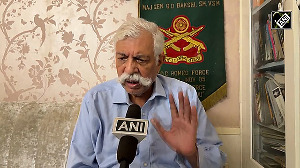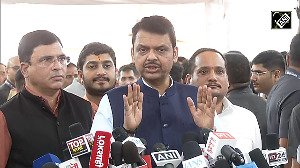As cricketing ability goes, there is no comparison between Sanjay Manjrekar and Sachin Tendulkar. But while the former has produced a wonderful autobiography, the latter’s book is deadly dull. In batting, they were the exact opposite: Manjrekar was a bore and Sachin an absolute marvel, says T C A Srinivasa-Raghavan.

Regular readers may have noticed that I read a lot of autobiographies, mostly of cricketers, economists, civil servants, politicians and judges. The best are the reflective ones; the worst are the one-damn-thing-after another ones.
For example, as cricketing ability goes, there is no comparison between Sanjay Manjrekar and Sachin Tendulkar. But while the former has produced a wonderful autobiography, the latter’s book is deadly dull. In batting, they were the exact opposite: Manjrekar was a bore and Sachin an absolute marvel.
There are three other books that all cricket fans must read. One is by Mark Nicholas, one by David Gower and the other is by Dickie Bird who stood in all sorts of matches for 24 years. All played county cricket when its standards were top class and Gower, of course, played for and captained England for several years.
Nicholas went on to become a journalist and a commentator. Gower has become a commentator and environmentalist. Bird became an umpire. All have terrific stories to tell, especially Bird.
His account of what happened when he stood in the 1983 World Cup Final, which India won, is riveting. He says around the 15th over Kapil Dev told him India was going to win the match because the West Indies were taking it very easy. Bird didn’t believe him but in the end that’s exactly what happened. Kapil knew.
Bird saw the game, for 24 long years, from a place that very privileged to see it from. He also controlled the play. His description of intimidation by West Indian fast bowlers and how he disciplined them is riveting. He wasn’t the only one of course but in the end someone has to implement the rules.
I am now waiting for Saurav Ganguly’s book. I think it will be very good, both reflective and anecdotal. It will be interesting to see where it falls between Sachin and Manjrekar. He is not the type to avoid controversial conclusions.
Of the other four categories -- politicians, civil servants, judges, and economists -- the first three have one thing in common. They are all involved in either devising public policy or implementing it.
But only a few are reflective. Instead, quite irritatingly, most of them tend to be boastful, either in an understated way or in a loud way. The choices that confronted them and how they finally chose one course of action over other options are rarely discussed.
Judges, though, have an alibi. If you want to see how they thought through some point of law you can read their judgments. But this is a very tedious option. Besides, their English can be appalling.
Cricketers, if anything, err on the other side. They can go on and on about why they did something didn’t. But unlike the other three groups, they tend to be quite generous in their praise for other players, even contemporaries.
I have an explanation for this: While cricketers try to explain their mistakes, the rest try to extol their successes. This could be because while the cricketers are watched closely and get a lot of recognition in the form of praise and abuse, the judges and the civil servants hardly ever do. This must hurt.
Politicians fall in an in-between category. They are closely watched and they get a lot of abuse. But rarely do they get any recognition, which is a pity because the majority of them do, in fact, do a lot of good work. But it is in the nature of things, possibly in the nature of power, that only their misdeeds receive attention, whence the need to boast.
As for economists, in an earlier column I had pointed out how so few of them write autobiographies. So I shan’t repeat myself. Suffice it to say that for a bunch that thinks that the world goes round because of them, they are a very reticent bunch.
The best among them have a very humble view of themselves. One of them is C H Hanumantha Rao, who will soon be 90. I have recently received his memoirs and am looking forward to reading them.
And, of course, as everyone knows, Montek Singh Ahluwalia is also writing his memoirs. He is unlikely to say anything controversial. But after 40 years in government, one hopes he writes about how decisions were actually taken, that is, the political considerations that tipped the balance.
I know of a few, so I am looking forward with great interest to Mr Ahluwalia’s version.












